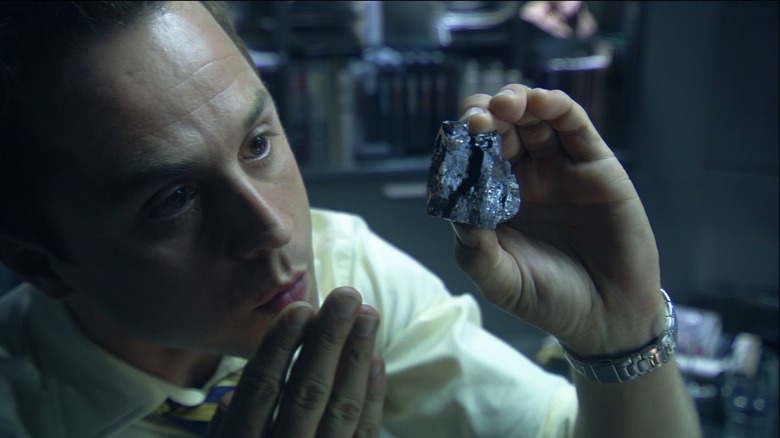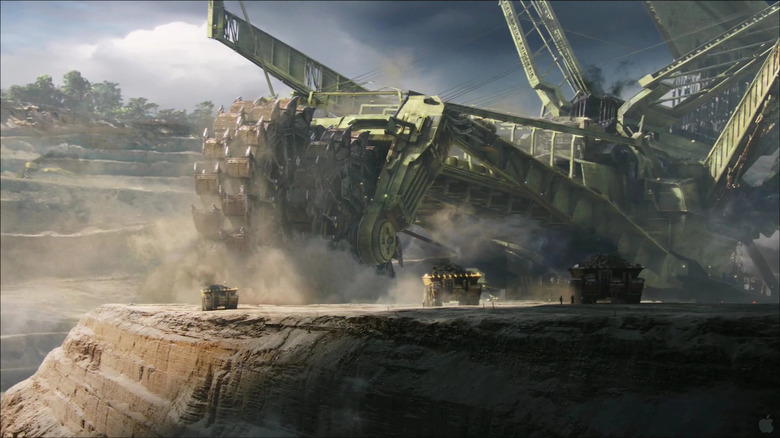James Cameron Explains The Origins Behind Avatar's Unobtanium
There are certain moments in cinema history you remember as real groaners. I believe kids today call it "cringe." Sometimes it's a brief moment from a movie, like the awkward John Cena love scene in "Trainwreck." Other times, you realize the entire direction of the film is about to go very wrong, like when Luke Skywalker chucks his lightsaber over his shoulder in the early moments of "Star Wars: The Last Jedi."
In the case of James Cameron's "Avatar," the cringe moment comes the first time RDA head administrator Parker Selfridge (Giovanni Ribisi) utters the word "unobtanium." It's not so much the plot point of a rare mineral as the film's MacGuffin (an object, device, or event necessary to move the plot along), but rather the name of it.
After all, at a cost of $237 million to produce, it raises the question: In a film that created an entirely fictional language for the Naʼvi, how was unobtanium the best name Cameron could come up with for the precious mineral?
But he's James Cameron and I'm ... well, I'm writing about James Cameron, so he obviously knows best. But just how did he come up with the name, and what's the justification for the infamous unobtanium?
It's more than just a word
"Avatar" is a sci-fi tale of capitalism and colonialism, all based around the search for a precious mineral, dubbed unobtanium, which is needed as an energy source on Earth. When humans find the mineral in the year 2154 on the planet Pandora, they do what humans would be expected to do: raid the planet and attempt to take as much of the unobtanium they can -– ahem -– obtain.
In a Q&A after an "Avatar" screening, star Zoe Saldana explained how she sees unobtanium as less of a MacGuffin and rather the film's entire message. The actor said:
"That's what I loved most about the movie: It is a telling of what has been going on. Not only have we done this to earth, but we will move on to other environments and other places, we'll do the same things over there unless we learn. 'Avatar' is a very good mirror of what our history has been up to now. It's not a preachy point, it's about curbing our tendencies."
As for the name itself? Cameron admitted that he and his team had been ridiculed for the name of the mineral. But the filmmaker gets the last laugh as the name has roots in actual science, even if that wasn't always his top concern.
Unobtanium is a scientific term – kind of
When asked about the name unobtanium, Cameron explained where the term comes from. "If you're in engineering at all, whenever engineers can't solve a problem on a designing a device or a system, they'll say, 'Well, this piece here needs to be made out of unobtainium,'" the director said. "It's the thing you can't have in material science. It's an engineering joke. Like Uranium, Germanium and unobtainium."
We weighed in with the Children's Museum of Indianapolis to check the filmmaker's work. According to their website:
"Unobtainium is not a real element, but it is a real word! Since the 1950s, engineers and scientists have used the word to describe the perfect material to solve a particular engineering problem – except that it doesn't exist! Over the years the meaning of Unobtainium has been expanded to describe real elements on Earth that are very rare and expensive (although they do exist), many of which are used in electronics."
The Chicago Tribune confirmed as well, calling the term "a jokey word used to describe a fantastical material that is either nearly impossible to get or simply doesn't exist. Similar terms include 'handwavium' and 'wishalloy,' as in: 'If only I had some wishalloy, I could make this perpetual motion machine work!'"
So, while it still sounds groan-worthy in the movie, it turns out unobtanium is an actual word used in science. Still, as one of the most groundbreaking sci-fi films of recent memory with a massive budget of nearly a quarter of a billion dollars, we could hope for a term not deemed a "jokey word" for the narrative's main plot device. But now, with four sequels on the horizon, I suppose that's just out of the questionavium.


